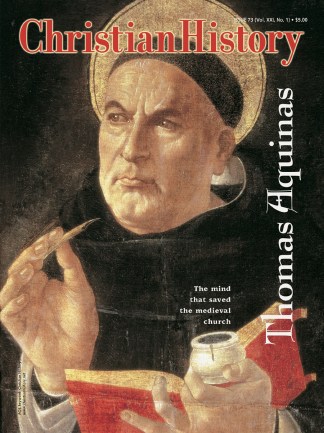[Thomas] had returned victorious from his last combat with [radical Aristotelian] Siger of Brabant; returned and retired. This particular quarrel was the one point, as we may say, in which his outer and his inner life had crossed and coincided; he realized how he had longed from childhood to call up all allies in the battle for Christ; how he had only long afterwards called up Aristotle as an ally; and now in that last nightmare of sophistry, he had for the first time truly realized that some might really wish Christ to go down before Aristotle.
He never recovered from the shock. He won his battle, because he was the best brain of his time, but he could not forget such an inversion of the whole idea and purpose of his life.
He was the sort of man who hates hating people. He had not been used to hating even their hateful ideas, beyond a certain point. But in the abyss of anarchy opened by Siger’s sophistry … he had seen the possibility of the perishing of all idea of religion, and even of all idea of truth.
Brief and fragmentary as are the phrases that record it, we can gather that he came back with a sort of horror of that outer world, in which there blew such wild winds of doctrine, and a longing for the inner world which any Catholic can share, and in which the saint is not cut off from the simple men. He resumed the strict routine of religion, and for some time said nothing to anybody.
And then something happened (it is said while he was celebrating Mass), the nature of which will never be known among mortal men.
His friend Reginald asked him to return also to his equally regular habits of reading and writing, and following the controversies of the hour. He said with a singular emphasis, “I can write no more.” There seems to have been a silence; after which Reginald again ventured to approach the subject; and Thomas answered him with even greater vigor, “I can write no more. I have seen things which make all my writings like straw.”
— from G.K. Chesterton, Saint Thomas Aquinas: “The Dumb Ox” (Doubleday, 1956)
Copyright © 2002 by the author or Christianity Today/Christian History magazine. Click here for reprint information on Christian History.










